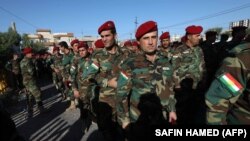Iraqi Kurds vote for new parliament in long-delayed elections
| Publisher | Radio Free Europe/Radio Liberty |
| Publication Date | 30 September 2018 |
| Cite as | Radio Free Europe/Radio Liberty, Iraqi Kurds vote for new parliament in long-delayed elections, 30 September 2018, available at: https://www.refworld.org/docid/5c34a68fc.html [accessed 30 October 2019] |
| Disclaimer | This is not a UNHCR publication. UNHCR is not responsible for, nor does it necessarily endorse, its content. Any views expressed are solely those of the author or publisher and do not necessarily reflect those of UNHCR, the United Nations or its Member States. |
2018-09-30
 Kurdish Peshmerga fighters line up before voting for parliamentary elections in Iraq's Kurdish region outside a polling station in Irbil on September 28 as Kurdish armed forces voted ahead of the general public.
Kurdish Peshmerga fighters line up before voting for parliamentary elections in Iraq's Kurdish region outside a polling station in Irbil on September 28 as Kurdish armed forces voted ahead of the general public.
Iraq's Kurdistan region has held long-delayed parliamentary elections, amid growing discontent with perceived corruption and economic hardship.
More than 700 candidates were vying for 111 seats in the September 30 vote in the oil-producing region.
Eleven seats are reserved for members of religious and ethnic minorities: five for Turkmen candidates; five for Christians; and one for the Armenian community.
The Kurdistan Democratic Party (KDP) and its rival Patriotic Union of Kurdistan (PUK), which have long dominated Kurdish politics, were expected to win the lion's share of the vote.
However, the PUK said it will not recognize the election results, citing fraud in the voting process, according to the Reuters news agency.
The elections come a year after the region, which gained autonomous status after the 1991 Gulf War, made a failed bid to break away from the rest of Iraq.
The last parliamentary elections were in 2013, but the assembly stopped meeting in 2015 amid internal political tensions and the war against the extremist group Islamic State.
The political deadlock also delayed new elections, which were originally planned for November 2017.
Based on reporting by AP, AFP, and Reuters
Link to original story on RFE/RL website
